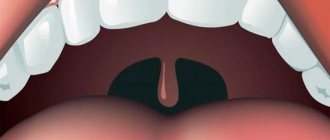If the tongue in the throat is swollen and significantly increased in size, this may indicate the presence of a serious disease.
The uvula is the most important element of the soft palate; it consists of smooth muscle cells and many blood vessels. In its normal state, the organ is very small in size; a person does not even feel it.
The organ performs many important functions in the nasopharynx area, so if it is dysfunctional, a person may face dangerous ailments that pose a threat to life. By what signs can you identify uvulitis, and what to do if this deviation occurs?
No singer neglects to take care of his own voice. Some people drink exclusively warm water, others wear scarves even in summer, others prefer honey and raspberries as a tasty way to prevent throat diseases. However, they all use special exercises to strengthen and preserve their voice.
The essence of pathology
Most people don't know what the uvula is called. In medicine, the organ is called the “conical process” and takes part in a variety of functions:
- separates food ducts;
- distributes and directs air flows;
- activates the gag reflex if necessary;
- reduces the likelihood of infection through the throat;
- protects the throat from penetration of cold air;
- takes part in the speech.
If the uvula (throat) increases in size and becomes inflamed, a person develops uvulitis. The disease progresses rapidly, from the first days a person begins to experience pain and discomfort in the palate.
The disease entails disruption of most of the functions of the tongue, which can cause very serious complications. That is why experts warn that at the first signs of swelling, you must immediately seek qualified help.
Why the tongue in the throat swells: reasons
If upon examination the soft palate is clean and the uvula is inflamed, the doctor will diagnose uvulitis. Most often, this disease has an acute form, which is characterized by suddenness - pain and swelling appear while eating or even at night during sleep. Reasons include:
- inflammatory pathologies - ENT infections, tonsillitis, advanced dental diseases, abscesses, diphtheria, tuberculosis, sexually transmitted diseases, HIV;
- chemical or thermal damage to the mucous membrane as a result of exposure of the tissue to aggressive compounds (burn with alkali or acid), as well as consumption of hot food and after alcohol;
- allergies – when including foods of an allergic nature in the diet, inhaling allergens (chemicals, natural irritants), taking medications;
- growths and formations in the pharynx - polyps, cysts. In addition to the immediate causes, there are associated factors that influence the enlargement of the tongue in the throat. This:
- a stuck bone in the throat that injures the mucous membrane;
- consumption of low-temperature drinks and foods;
- consequences of instrumental manipulations during examinations of the respiratory and gastrointestinal tract, as well as dental procedures;
A tumor of the uvula can appear after vomiting, especially prolonged and repeated attacks, from snoring and in those who smoke a lot.
Symptoms
If a person has an inflamed and swollen uvula on the soft palate, the signs of the disorder will be so pronounced that they cannot be confused with something else. Regardless of what causes uvulitis, the most common symptoms are:
- There is a feeling of a foreign object in the throat, which may indicate an increase in symptoms, and the swelling is very severe.
- Nausea and urge to vomit.
- Difficulty breathing.
- Pain and difficulty swallowing food.
- Speech dysfunction, the appearance of hoarseness.
- Increased salivation.
If swelling is caused by allergies, the pathology may be accompanied by the following disorders:
- appearance of cough;
- severe sneezing;
- the appearance of a rash in the oral cavity;
- tearing eyes;
- constant sore throat.
If uvulitis is a consequence of an infectious disease, a person will suffer from the following symptoms:
- excessive dryness of the throat mucosa;
- runny nose;
- pain when swallowing;
- the appearance of chills or fever;
- purulent neoplasms on the tongue;
- general weakness.
Experts warn that if the tongue in the throat is swollen and increases in size, the disease should alert the patient. To select the appropriate treatment, it is necessary to identify the causes of the pathology; only an experienced physician can do this.
Causes
The causes of tongue swelling can be very diverse, ranging from injuries to allergies. It can be:
- mechanical trauma of the tongue;
- inflammation of the tongue or glossitis (causes and treatment of glossitis);
- infectious diseases;
- allergic reaction;
- anaphylactic shock;
- metabolic disease;
- thyroid disease (hypothyroidism);
- genetic disorders (Down syndrome);
- malignant tumors (sarcoma, oral cancer);
- injury due to uncomfortable dentures;
- piercing;
- pellagra;
- pernicious anemia;
- pituitary disorders.
Only an experienced doctor can differentiate oral diseases that cause swelling of the tongue.
Swelling of the tongue and throat can be dangerous to the health and life of the patient. Don't self-medicate! At the first sign of swelling, you should consult a doctor for help. If swelling develops too quickly and begins to make breathing difficult, call an ambulance to avoid suffocation.
Allergic uvulitis
If the throat uvula swells due to an allergic manifestation, antihistamines (Loratadine, Suprastin, Diazolin) are usually prescribed. To make the recovery of the swollen organ faster, you can use diuretics (Trifas, Veroshripon).
| A drug | Photo | Price |
| Loratadine | From 35 rub. | |
| Suprastin | From 132 rub. | |
| Diazolin | From 57 rub. | |
| Trifas | Check | |
| Veroshripon | From 93 rub. |
If the conical process is so swollen that the patient's life is in danger, it is necessary to use corticosteroids - medications that are prescribed as first aid for allergies to prevent complications. If after taking medications from this pharmaceutical. group, the patient’s condition will not improve, the only solution will be surgical intervention.
You can speed up the recovery process using traditional medicine methods. The patient needs to gargle several times a day with decoctions based on medicinal herbs (raspberry, St. John's wort), an infusion of garlic has also proven itself to be good (100 grams of peeled vegetable, pour 100 ml of water and leave the medicine to infuse for five hours).
Experts warn that if the uvula located on the roof of the mouth constantly swells due to allergies, it is necessary to identify what is the primary source of such a reaction in the body, otherwise the pathology may recur with a certain periodicity and significantly complicate the patient’s life.
What medications are used to treat an inflamed uvula?
When an inflamed tongue swells in the throat, the choice of medications is approached with great caution due to the high risk of complications of the respiratory system. All medicinal tactics are aimed at reducing swelling and relieving inflammation of the uvula.
Complex therapeutic tactics include the use of:
- antiallergic drugs - antihistamines (Lordestin) and glucocorticosteroids (Prednisolone, Triamcinolone);
- decongestant diuretics – Torasemide SZ, Hypothiazide, Furosemide. These medications are considered first aid and prevent the development of asphyxia.
- If the upper uvula is swollen after drinking alcohol, in order to stabilize the condition, Diazolin, Zyrtec or Aleron are prescribed and subsequent alcohol intake is completely avoided.
- When diagnosing a viral or bacterial infection that provoked inflammation of the uvula, antibiotics (Azithromycin, Amoxiclav) or antiviral drugs (Cycloferon, Remantadine, Arbidol) are prescribed.
Complex therapy also includes:
- treatment of the larynx with antiseptic sprays - Hexoral, Kameton;
- taking vitamin complexes (Vitrum, Multi-Tabs and immunomodulators (Immunity, Zdorov).
All medications are taken in a course, in accordance with the doctor’s prescription and under his supervision.
Pathogenic microbes
If the organ is swollen and taking antihistamines does not bring relief, most likely the illness is caused by mucous infections.
If the disease is of viral origin, you need to take antiviral drugs (Viferon or Arbidol), but when the pathology is caused by pathogenic microbes, you need to take antibiotics.
Often, with infectious uvulitis, various anti-inflammatory sprays are prescribed that fight the causative agents of the inflammatory process and reduce pain.
Abuse of bad habits
As surprising as it may be, excessive alcohol consumption and frequent smoking can also lead to swelling of the uvula mucosa. What measures to take in such a situation?
Doctors advise drinking as much warm liquid as possible. Why do this? If the kidneys and urinary system work at an accelerated rate, the body will quickly cleanse itself of toxins. If a person drinks little fluid, intoxication may last several days.
The following will also help speed up the recovery process:
- maintaining proper nutrition;
- maintaining oral hygiene;
- complete cessation of alcohol and smoking (at least for the duration of treatment).
Uvulitis is a dangerous pathology that, in the absence of competent and timely treatment, can cause various complications. That is why, in order to maintain your health, when the first symptoms of a disorder occur, you must immediately visit a doctor.
If discomfort in the throat occurs, which turns into painful sensations, treatment must be carried out immediately. The tongue tends to increase in size; it is necessary to monitor its condition.
The uvula interferes
People who are bothered by the uvula may experience snoring, a feeling of a lump in the throat, a feeling of discomfort, difficulty breathing, especially at night, and sometimes nausea due to pressure on the root of the tongue.
The appearance of this symptom is most often associated with either an anatomically low location of the soft palate or an enlargement of the uvula. A number of factors can lead to its occurrence. When snoring, the beating of the tongue against the walls of the pharynx causes mechanical damage, when smoking, tar has a negative chemical effect on its mucous membrane, and infections of the tonsils or allergic reactions lead to severe swelling. All these processes lead to chronic inflammation of the mucous membrane, and against this background, the muscles of the uvula are replaced by connective tissue and lose their tone. As a result, the uvula can no longer be pulled up and hangs down, sometimes even touching the root of the tongue.
Is the uvula getting in the way? Contact our Center and we will help you effectively! Sign up by phone.
Fortunately, the uvula has minimal impact on the lumen of the pharynx and does not make a significant contribution to the occurrence of sleep apnea. At the same time, its changes cause snoring, because the uvula is the most mobile part of the pharynx, which vibrates when air passes and produces a characteristic sound.
Patients with this problem are often recommended surgical treatment, for example, partial or complete removal of the tongue using the radio wave method. As a result, the vibration of the palate decreases and snoring disappears. This is possible if the uvula was the only cause of snoring, but we must remember that one person may have several factors that cause an unpleasant sound during sleep. This may be weight gain, a deviated nasal septum, polyps, adenoids and other changes in the walls and lumen of the pharynx. With this “set” there are often pauses in breathing during sleep - obstructive apnea syndrome.
In this case, soft palate surgery may not be the right choice. This is due to scarring of the walls of the pharynx and narrowing of the airway, which is unacceptable during apnea. It is much more effective to eliminate snoring in combination with apnea CPAP therapy, which prevents vibration and collapse of the pharyngeal walls, protecting your sleep and health at night.
Therefore, before removing the interfering tongue, you should consult a somnologist. If sleep apnea is present, the doctor will diagnose it, determine the severity of the disease, determine the causes and risk factors and, based on all this, recommend the optimal treatment regimen.
Assess yourself for signs of illness. These are shortness of breath at night, cough, sweating during sleep, severe daytime sleepiness, frequent urination, high blood pressure, decreased potency, and heartburn. You can also take an OSA test.
Patients with sleep apnea should begin treatment as quickly as possible. The disease is dangerous, it several times increases the risk of heart attack and stroke, accelerates the development of cardiovascular and other diseases, contributes to the appearance of endocrine disorders, and daytime sleepiness with OSA greatly increases the likelihood of injury or getting into an accident.
Is the uvula getting in the way? Contact our Center and we will help you effectively! Sign up by phone.







